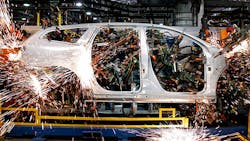AUTO ROUNDUP: GM, Ford, Toyota Sales Slide in July
Ford Motor Co. and General Motors Co. reported U.S. light-vehicle sales in July that fell more than analysts had anticipated while Nissan Motor Co. and Fiat Chrysler Automobiles NV gained less than expected, reinforcing concerns that the market may have peaked with last year’s record deliveries.
GM, the largest U.S. automaker, said sales slid 1.9%, after analysts projected a 1% drop. No. 2 Ford reported 215,268 light-vehicle sales, according to Bloomberg’s calculations, for a 3% decline that was wider than the 0.5% decline predicted by analysts. Nissan reported a 1.2% increase, short of the 3% rise projected by analysts. Fiat Chrysler said its sales rose 0.3%; analysts had projected a 1.9% gain. Honda Motor Co. surprised with a 4.4% increase after analysts projected a 0.4% decline, and Toyota Motor Corp. sales fell 1.4% less than the 2.9% drop analysts had estimated.
Analysts projected that the industry’s seasonally-adjusted selling rate was 17.6 million vehicles, little changed from a year earlier.
“It’s been six years of unprecedented growth and it had to come to an end,” said Michelle Krebs, a senior analyst with research AutoTrader, said in an interview. “The big question now is: How deep does it dip and how long does it dip? And I can’t answer that.”
Ford’s sport utility vehicles had a rare down month, dropping 5.6% in July. Explorer sales were off 22%, while the Escape compact SUV fell 10%. F-Series pickup sales dropped 1%. Ford said sales to fleet buyers rose 6% while deliveries to individual customers fell 6%.
GM’s bread-and-butter Chevrolet division saw a 5.3% drop in total sales, though GM said the brand’s retail sales rose 3%. The automaker has been cutting back on sales to rental fleets in pursuit of better profit margins.
While Nissan brand sales rose 1.7% on strong light-truck demand, the company’s Infiniti premium line reported a 4.7% drop as car sales fell by more than a third.
The U.S. auto industry’s six-year climb from its lowest point since the early 1980s to record sales of 17.5 million last year finally might be coming to an end. Ford said last week it saw no growth ahead for U.S. auto sales as it reported a second-quarter profit that fell short of analysts’ estimates. The industry is hoping for a long plateau at a healthy level, but the days of auto sales driving the U.S. economy appear to be over.
The sluggish economy might have finally found a way to dim its brightest light, as affordability has become the biggest impediment to buying a new car, according to a recent survey by AutoTrader. Its affiliate, Kelley Blue Book, said Tuesday that average new-vehicle prices rose 2.5% last month compared with a year earlier to $34,264.
“The people who could afford a car, got a car,” Krebs said. “If you look at stagnation of wages and the increase in the price of everything, cars included, there’s a lot of demand on household income that isn’t increasing.”
Automakers already have responded by boosting incentives to customers, with average discounts up 13% in the first half while industrywide sales rose 1.5%, according to researcher Autodata Corp.
“The competitive environment has increased as growth has slowed and the retail demand has weakened,” Ford CEO Mark Fields told analysts on the second-quarter earnings conference call July 28. “The bottom line is that we’ve seen a tougher pricing environment this quarter and we will face one going forward.”
By Keith Naughton and Polina Noskova, with assistance from David Welch, Bloomberg
German New Car Sales Drop, Too
New car registrations in Germany, a key indicator of consumer demand, suffered a sharp drop in July, official data showed on Tuesday. Almost 279,000 new cars took to the road in July 2016, down 3.9% compared with the same month last year, the federal transport authority KBA said.
It was the first drop in new registrations after several months of growth. Over the seven months to July as a whole, new car registrations increased 5.4% compared with 2015’s figures at just over 2 million.
Most German carmakers — which accounted for 64% of all registrations — saw falling numbers of new registrations in July. Volkswagen, the biggest German brand, continues to feel the effects of a diesel emissions scandal with registrations down 12.6%. Diesel vehicles overall saw a drop of 7.3% in new registrations.
Meanwhile just 785 fully electric cars were registered in July, almost 20% fewer than the same month last year — despite a recently-introduced government program of cash incentives for buyers.
Copyright Agence France-Presse, 2016
About the Author
Bloomberg
Licensed content from Bloomberg, copyright 2016.
Agence France-Presse
Copyright Agence France-Presse, 2002-2025. AFP text, photos, graphics and logos shall not be reproduced, published, broadcast, rewritten for broadcast or publication or redistributed directly or indirectly in any medium. AFP shall not be held liable for any delays, inaccuracies, errors or omissions in any AFP content, or for any actions taken in consequence.
